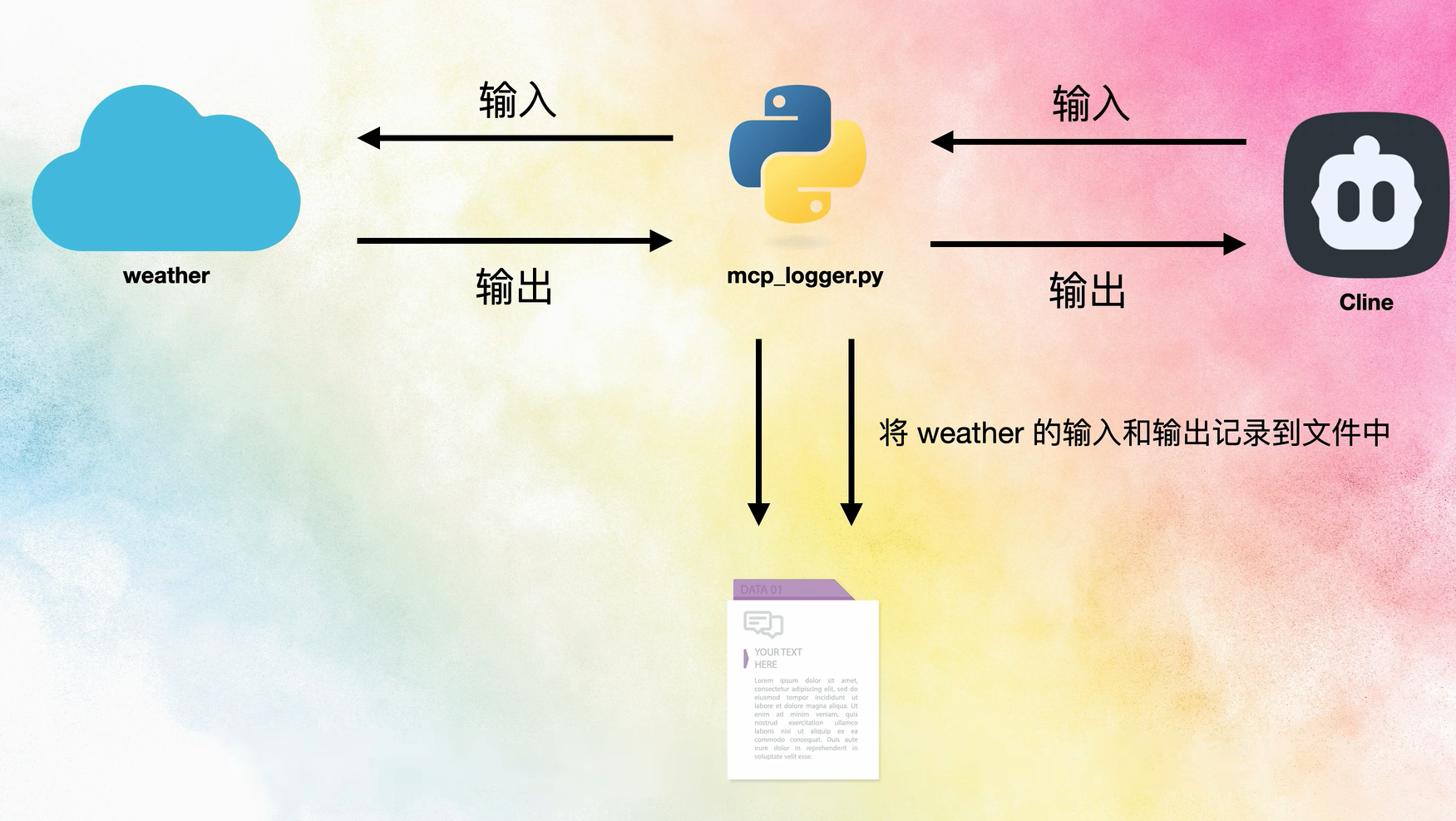1
2
3
4
5
6
7
8
9
10
11
12
13
14
15
16
17
18
19
20
21
22
23
24
25
26
27
28
29
30
31
32
33
34
35
36
37
38
39
40
41
42
43
44
45
46
47
48
49
50
51
52
53
54
55
56
57
58
59
60
61
62
63
64
65
66
67
68
69
70
71
72
73
74
75
76
77
78
79
80
81
82
83
84
85
86
87
88
89
90
91
92
93
94
95
96
97
98
99
100
101
102
103
104
105
106
107
108
109
110
111
112
113
114
115
116
117
118
119
120
121
122
123
124
125
126
127
128
129
130
131
132
133
134
135
136
137
138
139
140
141
142
143
144
145
146
147
148
149
150
151
152
153
154
155
156
157
158
159
160
161
162
163
164
165
166
167
168
169
170
171
172
173
174
175
176
177
178
179
180
181
182
183
184
185
186
187
188
189
190
191
192
193
194
195
196
197
198
199
200
201
202
203
204
205
206
207
208
209
210
211
212
213
214
215
216
217
218
219
220
221
222
223
224
225
226
227
228
229
230
231
232
233
234
235
236
237
238
239
240
241
242
243
| vim mcp_logger.py
------------------------ mcp_logger.py -----------------------
import sys
import subprocess
import threading
import argparse
import os
LOG_FILE = os.path.join(os.path.dirname(os.path.realpath(__file__)), "mcp_io.log")
parser = argparse.ArgumentParser(
description="Wrap a command, passing STDIN/STDOUT verbatim while logging them.",
usage="%(prog)s <command> [args...]"
)
parser.add_argument('command', nargs=argparse.REMAINDER,
help='The command and its arguments to execute.')
open(LOG_FILE, 'w', encoding='utf-8')
if len(sys.argv) == 1:
parser.print_help(sys.stderr)
sys.exit(1)
args = parser.parse_args()
if not args.command:
print("Error: No command provided.", file=sys.stderr)
parser.print_help(sys.stderr)
sys.exit(1)
target_command = args.command
def forward_and_log_stdin(proxy_stdin, target_stdin, log_file):
"""Reads from proxy's stdin, logs it, writes to target's stdin."""
try:
while True:
line_bytes = proxy_stdin.readline()
if not line_bytes:
break
try:
line_str = line_bytes.decode('utf-8')
except UnicodeDecodeError:
line_str = f"[Non-UTF8 data, {len(line_bytes)} bytes]\n"
log_file.write(f"输入: {line_str}")
log_file.flush()
target_stdin.write(line_bytes)
target_stdin.flush()
except Exception as e:
try:
log_file.write(f"!!! STDIN Forwarding Error: {e}\n")
log_file.flush()
except: pass
finally:
try:
target_stdin.close()
log_file.write("--- STDIN stream closed to target ---\n")
log_file.flush()
except Exception as e:
try:
log_file.write(f"!!! Error closing target STDIN: {e}\n")
log_file.flush()
except: pass
def forward_and_log_stdout(target_stdout, proxy_stdout, log_file):
"""Reads from target's stdout, logs it, writes to proxy's stdout."""
try:
while True:
line_bytes = target_stdout.readline()
if not line_bytes:
break
try:
line_str = line_bytes.decode('utf-8')
except UnicodeDecodeError:
line_str = f"[Non-UTF8 data, {len(line_bytes)} bytes]\n"
log_file.write(f"输出: {line_str}")
log_file.flush()
proxy_stdout.write(line_bytes)
proxy_stdout.flush()
except Exception as e:
try:
log_file.write(f"!!! STDOUT Forwarding Error: {e}\n")
log_file.flush()
except: pass
finally:
try:
log_file.flush()
except: pass
process = None
log_f = None
exit_code = 1
try:
log_f = open(LOG_FILE, 'a', encoding='utf-8')
process = subprocess.Popen(
target_command,
stdin=subprocess.PIPE,
stdout=subprocess.PIPE,
stderr=subprocess.PIPE,
bufsize=0
)
stdin_thread = threading.Thread(
target=forward_and_log_stdin,
args=(sys.stdin.buffer, process.stdin, log_f),
daemon=True
)
stdout_thread = threading.Thread(
target=forward_and_log_stdout,
args=(process.stdout, sys.stdout.buffer, log_f),
daemon=True
)
stderr_thread = threading.Thread(
target=forward_and_log_stdout,
args=(process.stderr, sys.stderr.buffer, log_f),
daemon=True
)
def forward_and_log_stderr(target_stderr, proxy_stderr, log_file):
"""Reads from target's stderr, logs it, writes to proxy's stderr."""
try:
while True:
line_bytes = target_stderr.readline()
if not line_bytes: break
try: line_str = line_bytes.decode('utf-8')
except UnicodeDecodeError: line_str = f"[Non-UTF8 data, {len(line_bytes)} bytes]\n"
log_file.write(f"STDERR: {line_str}")
log_file.flush()
proxy_stderr.write(line_bytes)
proxy_stderr.flush()
except Exception as e:
try:
log_file.write(f"!!! STDERR Forwarding Error: {e}\n")
log_file.flush()
except: pass
finally:
try:
log_file.flush()
except: pass
stderr_thread = threading.Thread(
target=forward_and_log_stderr,
args=(process.stderr, sys.stderr.buffer, log_f),
daemon=True
)
stdin_thread.start()
stdout_thread.start()
stderr_thread.start()
process.wait()
exit_code = process.returncode
stdin_thread.join(timeout=1.0)
stdout_thread.join(timeout=1.0)
stderr_thread.join(timeout=1.0)
except Exception as e:
print(f"MCP Logger Error: {e}", file=sys.stderr)
if log_f and not log_f.closed:
try:
log_f.write(f"!!! MCP Logger Main Error: {e}\n")
log_f.flush()
except: pass
exit_code = 1
finally:
if process and process.poll() is None:
try:
process.terminate()
process.wait(timeout=1.0)
except: pass
if process.poll() is None:
try: process.kill()
except: pass
if log_f and not log_f.closed:
try:
log_f.close()
except: pass
sys.exit(exit_code)
------------------------ mcp_logger.py -----------------------
|
